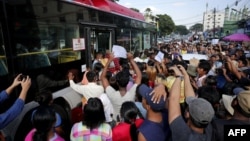At least nine journalists were among the more than 7,000 people freed from prisons across Myanmar on Wednesday.
Myanmar’s junta ordered the release to mark the country’s 75th independence anniversary, with detainees issued pardons or reduced sentences.
Among those freed was Myo Min Tun, who worked as an editor for Myit Makha Media Group, an independent news agency and former VOA affiliate.
But media workers and rights organizations noted that at least 50 journalists remain in prison. Among them is Sithu Aung Myint, a VOA contributor who is serving multiple sentences.
The plight of those still incarcerated was on the minds of those released.
“If you ask me whether I'm happy about being released, I can say that I'm not happy, because many journalists are still in prison,” one journalist told VOA Burmese.
The journalist, who asked for anonymity to avoid repercussions, said, “Until and unless they all are free, the media community cannot carry on covering news professionally.”
Myanmar is the third-worst jailer of journalists globally, ranking only behind Iran and China for the number of reporters imprisoned for their work, according to data from the Committee to Protect Journalists.
Many are detained on accusations of “incitement” or “false news” as the junta “doubled down on its efforts to mute reporters,” CPJ found in a report released last month.
The risk of arrest is so great that many news outlets “remain reluctant to identify their detained staff and freelancers to avoid the harsher sentences often meted out to journalists,” CPJ found.
A spokesman for the military council has denied that journalists are arrested for their work, saying authorities arrest only those who violate laws.
Even with the release Wednesday, a veteran journalist said local media groups that document arrests estimate that around 50 journalists remain in prison.
“Another thing is that even though the journalists have been released, these people are not in a position to resume their work as journalists. Freedom of the media is still under threat," the journalist, who asked not to be named, told VOA Burmese.
Myanmar’s media have suffered under nearly two years of the military takeover, analysts say.
"The media situation in Myanmar has returned to the abysmal state it was in before the democratic transition started in 2011," Phil Robertson, deputy Asia director at Human Rights Watch, told VOA late last year.
Citing bans on some media outlets and new regulations, the Bangkok-based expert said Myanmar was "literally back to where it was before."
This story originated in VOA’s Burmese Service.







